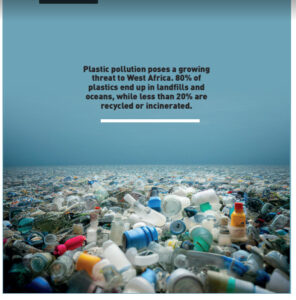Turning the Tide: Uniting to combat plastic pollution in West Africa for a sustainable future


Lionel Axel Kadja
Every year, over 350 million tons of plastic are produced worldwide, with 50% being used for creating everyday items such as containers and packaging. As urban populations grow, our throw-away culture and inadequate waste management systems have led to severe consequences for our environment, wildlife, and ecosystems. This year’s World Environment Day, which was celebrated on June 5th, 2023, was hosted by Côte d’Ivoire and supported by the Netherlands. This year’s theme, #BeatPlasticPollution, calls for urgent and sustainable solutions. It is crucial to address the pressing issue of plastic pollution, particularly in West Africa. Countries, businesses, and individuals must unite to embrace responsible plastic usage, ensuring a cleaner and greener future for the region.
Plastic pollution poses a growing threat to West Africa. 80% of plastics end up in landfills and oceans, while less than 20% are recycled or incinerated. Although the region generates approximately three million tons of plastic waste (circa 1% of the global output) each year, there is evidence of microplastics originating from other regions ending up in tap water, salt, and beer consumed in West Africa. This pollution harms marine life and negatively impacts the livelihoods of coastal communities dependent on agriculture and fish farming. Additionally, the costs of cleaning and maintaining tourist sites further reduce our national income and perpetuate poverty.
Raising awareness and fostering collaboration between developed and developing countries at different stages of progress will be instrumental in our collective efforts where plastic pollution no longer threatens our environment and livelihoods. Everyone needs to come together to tackle this issue comprehensively. Consumers need to rethink their plastic consumption habits, opting for reusable alternatives and reducing reliance on single-use plastics. Manufacturers must take responsibility by reducing the amount of plastic they use, investing in eco-friendly packaging, and exploring sustainable alternatives. Governments can play a crucial role by improving waste management systems, encouraging the use of biodegradable packaging, promoting recycling, and upcycling, and embracing circular economy principles that contribute to a more sustainable and plastic-free environment while implementing policies that discourage the use of certain plastics, following successful examples set by countries like Rwanda and Kenya.

Agriculture plays a pivotal role in West African economies and can contribute to plastic pollution reduction efforts. Agricultural plastics, such as polymers, are widely used by farmers to enhance production, reduce crop losses, and conserve water. However, their extensive use has emerged as a threat to environmental sustainability, as most plastics turn to waste within a year without recycling. By adopting sustainable farming practices that minimise plastic usage and promoting agroecology, conservation agriculture, and the use of cover crops instead of plastic mulching, the agricultural sector can lead by example. The adoption of innovative alternatives to plastic, such as biodegradable plant-based packaging materials, will benefit the environment and support the growth and competitiveness of West African agriculture.
AGRA calls on all actors and stakeholders to adopt and deploy the 6R model for better managing agricultural plastics: Refuse, Redesign, Reduce, Reuse, Recycle, and Recover. By refusing unnecessary plastics, redesigning products for increased recyclability, reducing plastic consumption, promoting reuse, improving recycling infrastructure, and exploring recovery options, the agricultural sector can significantly contribute to combating plastic pollution.
World Environment Day 2023 offers a critical platform to showcase the proactive measures taken by West African countries, businesses, and individuals to address plastic pollution. Let this day be a turning point in our fight against plastic pollution. Together, we can beat plastic pollution and pave the way for a cleaner, healthier, and more sustainable environment for future generations.
The time to act is now, and it is up to every one of us to make a difference. Join us in embracing sustainable practices, promoting responsible plastic usage, and protecting the beauty and richness of West Africa.
The writer is the Regional Head for Western Africa at AGRA

